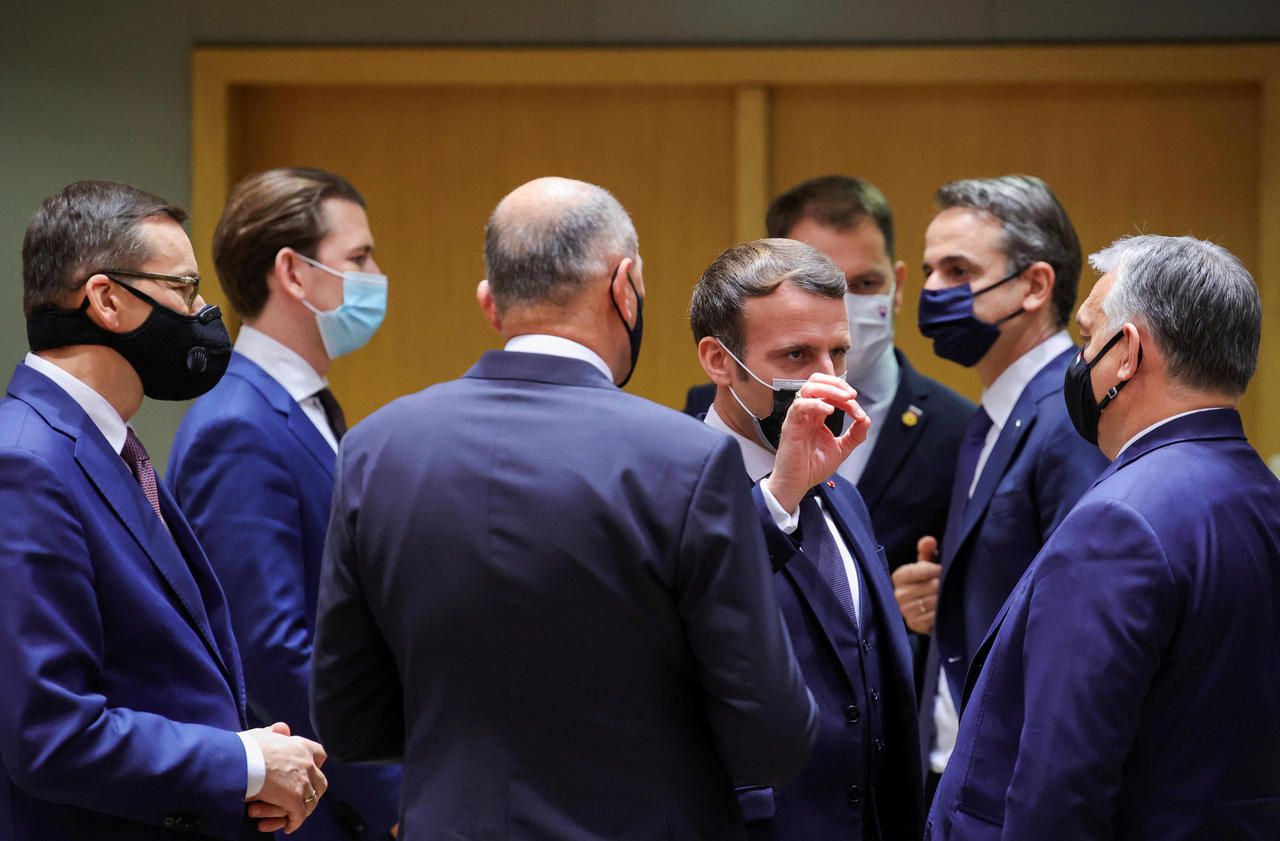Emmanuel Macron contracted the Covid-19.
The announcement, this Thursday, December 17, that the President of the Republic had tested positive for the coronavirus, sparked a cascade of quarantines among politicians or foreign leaders who met him recently, but also a number of questions ...
1. Is it serious?
A priori, no.
Soon 43 years old (the president will blow out his candles next Monday), Emmanuel Macron is not one of the categories of the population at risk.
Especially since the Head of State is the subject of permanent attention by an army medical team led by a chief doctor.
It was after the appearance of "first symptoms" (cough and runny nose), on the night of Wednesday to Thursday, that the Head of State carried out a PCR test which turned out to be positive.
From Thursday at midday, he resumed his activities by videoconference.
On the images of his speech concluding the national humanitarian conference, Emmanuel Macron appeared a little paler than usual and with an FFP2 type mask, with better filtration capacity.
2. Where and when did the president catch the Covid?
As symptoms often appear between three and seven days after contamination, all eyes are on the European Council in Brussels on December 10 and 11.
A meeting of the 27 leaders of the European Union, where meetings were legion and where discussions lasted very late into the night to discuss European recovery, greenhouse gas emissions and Turkey.
Not easy, in these conditions, to keep the barrier gestures.
Especially for a president who is willingly touching with his interlocutors.
3. How is Brigitte Macron?
"She has no symptoms" and "has tested negative for Covid-19", specifies those around him.
The first lady carried out a test Thursday morning, the results of which arrived quickly.
At 67, Brigitte Macron is not at her first screening.
On October 19, after a trip to Valencia, and last Tuesday, the president's wife had already engaged in the exercise.
Each time, the tests came back negative.
However, the wife of the Head of State will remain in solitary confinement at the Elysee Palace for seven days, before taking a new test.
In the meantime, his agenda is messed up.
She had a videoconference on Thursday on Operation Yellow Pieces.
Expected in the coming days at Necker hospital, in a palliative care service for children, Brigitte Macron has canceled her visit.
4. Who are his potential contact cases?
Emmanuel Macron has rubbed shoulders with many personalities this week.
Starting with its Prime Minister, Jean Castex who, although tested negative on Thursday, went into solitary confinement, like the President of the Assembly Richard Ferrand, the Minister for Relations with Parliament Marc Fesneau, or the Secretary General of the Elysee Alexis Kohler.
Damien Abad, the boss of LR deputies, who had lunch with the other group presidents and the head of state on Tuesday, also opted for a quarantine unlike Jean-Luc Mélenchon, tested negative yesterday.
Five European leaders have also announced that they will be in solitary confinement as a precaution: the heads of Luxembourg government, Xavier Bettel, Belgian, Alexander De Croo, Portuguese Antonio Costa, tested negative, Spanish, Pedro Sanchez, as well as the President of the European Council Charles Michel.
On the other hand, the president of the European Commission Ursula von der Leyen, who had participated in a lunch Monday in Paris with the French president, did not consider a quarantine necessary.
5. What does this change for his work?
Placed in solitary confinement for seven days, Emmanuel Macron had to seriously review his agenda for the next few days.
And even hours that followed the result of his positive test, since it was finally by videoconference, from the Elysee Palace, that he participated Thursday evening at the conclusion of the round table of the National Humanitarian Conference.
Yet she was standing only a stone's throw away, just across the Seine, at the Quai d'Orsay.
A meeting during which he also mentioned "the constraints related to the moment".
Reinforced barrier gestures, remote meetings, telephone exchanges will therefore be his lot for the next few days.
These "constraints" will prevent him in particular from going next week to Lebanon, scheduled for December 22 and 23, when he was to spend a New Year's Eve with the French soldiers of UNIFIL, the United Nations Interim Force in Lebanon, and hold a series of meetings with Lebanese leaders.
The same goes for Jean Castex who, for his part, had planned to go to the forces stationed in Mali.
As for the next Council of Ministers, the last of the year, next Monday, it is well and truly maintained.
But not face to face.
The members of the government will discuss with the president by videoconference.
6. What other leaders have had the Covid?
They have been numerous since the start of the pandemic. In the United Kingdom, Prime Minister Boris Johnson, initially skeptical of the disease, was one of the first to catch it, in March. Prince Albert II of Monaco also tested positive around the same time. In April, Prince Charles, 71, fell victim to the disease, along with Russian Prime Minister Mikhail Michoustine. In Brazil, Jair Bolsonaro, who had long called the disease “flu-like” and refused to wear the mask, was diagnosed in July. In early October, Donald Trump, 74, and his wife Melania were infected. The same month, Algerian President Abdelmadjid Tebboune, 75, revealed that he was severely injured. He is still recovering today. Boris Johnson's condition required intensive care and Trump, suffering from a high fever, had to be hospitalized. But most of the leaders affected were content to observe a period of isolation and convalescence in their home.

